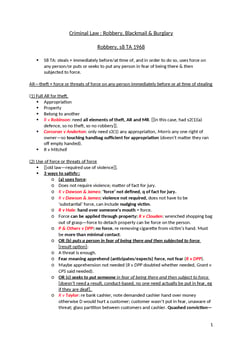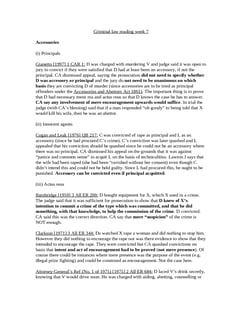R v Hennessy [1989] 1 W L R 287
Judgement for the case R v Hennessy
KEY POINTS
In cases involving offenses committed by a diabetic in a hyperglycemic state, a claim of stress, anxiety, and depression can be considered as potential external factors contributing to automatism.
A state of mind characterized by stress, anxiety, and depression may be legally recognized as prone to recur, and it can be considered capable of causing or contributing to a state of automatism in the eyes of the law.
FACTS
The appellant, an insulin-dependent diabetic, attempted to use automatism as a defense for charges related to his actions during a state of hyperglycemia, possibly aggravated by stress, anxiety, and depression due to not taking insulin and fasting.
During the trial, the judge concluded that the appellant's mental state primarily resulted from his diabetic condition, negating his automatism defense, and leading to a guilty plea.
On appeal, the appellant argued that stress, anxiety, and depression were external factors contributing to his state of mind, in line with Reg. v. Quick [1973] Q.B. 910, 922. He contended that the judge's ruling had erroneously excluded this defense from consideration by the jury.
JUDGEMENT
The appeal was dismissed. While external factors can indeed lead to stress, anxiety, and depression, it is essential to recognize that stress, anxiety, and depression, whether individually or collectively, do not qualify as the kind of external factors, as defined by law, capable of causing or contributing to a state of automatism.
These mental states are inherently prone to recurrence and lack the characteristics of novelty or accident necessary for an automatism defense. Therefore, the trial judge's ruling in this regard was accurate and valid.
COMMENTARY
The appellant, an insulin-dependent diabetic, had sought to employ automatism as a defense against charges related to his actions during a hyperglycemic state, possibly exacerbated by stress, anxiety, and depression due to neglecting insulin and fasting. However, the trial judge determined that the appellant's mental state was predominantly a consequence of his diabetic condition, which led to his guilty plea.
Upon appealing the conviction, the appellant contended that stress, anxiety, and depression should be considered external factors.
He argued that the trial judge had erroneously precluded this defense from being presented to the jury.
The appeal was dismissed. The court upheld the trial judge's ruling that stress, anxiety, and depression, although potentially triggered by external factors, do not qualify as external factors, as defined by law, capable of causing or contributing to a state of automatism.
ORIGINAL ANALYSIS
Defendant was a diabetic and, having neglected to eat or drink or taken insulin in several days and committed some crimes, including driving without a license, in a state of hypoglycaemia, possibly contributed towards by stress and anxiety.
The trial judge directed on insanity but not on automatism, saying that it didn’t apply.
Defendant appealed on the basis that stress, anxiety, depression, etc. were external factors which therefore made automatism the appropriate defence.
CA rejected his appeal since, although stress, etc. may have contributed to hypoglycaemic state, his state was overall caused by a disease, namely diabetes and therefore automatism didn’t apply.
Lord Lane
Said that if failure to appreciate nature and quality of act/omission was due to defect of mind then insanity is appropriate direction. If it did not occur due to a defect of mind then automatism is correct direction.
Lord Lane also asserts that depression, anxiety, etc., though possibly caused by external factors are nevertheless internal mental problems.
RELATED CASES
For Further Study on R v Hennessy

A collection of the best GDL notes the director of Oxbridge Notes (an O...
Need instant answers? Our AI exam tutor is here to help.
Ask questions 🙋 Get answers 📔 It's simple 👁️👄👁️
Our AI is educated by the highest scoring students across all subjects and schools. Join hundreds of your peers today.
Get StartedRelated Product Samples
These product samples contain the same concepts we cover in this case.
| Criminal Law | Defences Notes (32 pages) |
| GDL Criminal Law | General Defences Notes (10 pages) |

 Since 2010, Oxbridge Notes has been a trusted education marketplace, supplying high-quality materials from top achievers at universities like Oxford, Cambridge, LSE, Harvard, and Yale.
Since 2010, Oxbridge Notes has been a trusted education marketplace, supplying high-quality materials from top achievers at universities like Oxford, Cambridge, LSE, Harvard, and Yale.